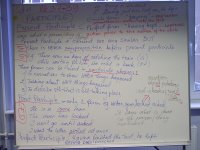The following topics have been taken (and translated) from "Riigi Teataja" and that is what you are supposed to have mastered in a foreign language by the end of your high school studies.
1. ALL about ME: I as a personality among others; special features, abilities, preferences, strengths/weaknesses
2. FAMILY/HOME: marriage and family; roles in family; rights and obligations, home and upbringing; family budget
3. FRIENDS: relationships between friends; social issues/problems
4. ENVIRONMENT: nature, nature protection, natural resources, climate, country/town, urbanization
ESTONIA: http://www.einst.ee/ government, economy, traditions, international relations
WORLD: international relations
5. ENGLISH-SPEAKING COUNTRIES (UK, USA, NZ, Australia etc): government, economy, traditions, international relations
6. HABITUAL ACTIONS: healthy lifestyle, nutrition, communication in service sector, accidents (giving aid)
7. EDUCATION / WORK: education system and study possibilities in Estonia and English-speaking countries, learning skills, exam skills; employment/unemployment; development in technology
8. HOBBIES, CULTURE: sports, art, music, theatre, important cultural figures; advertising and its role; Information society and its problems









